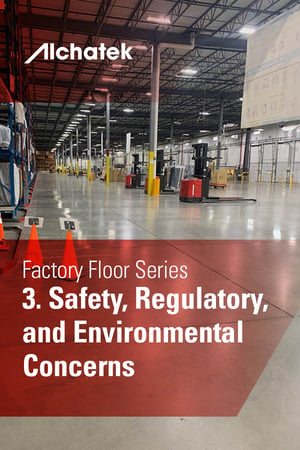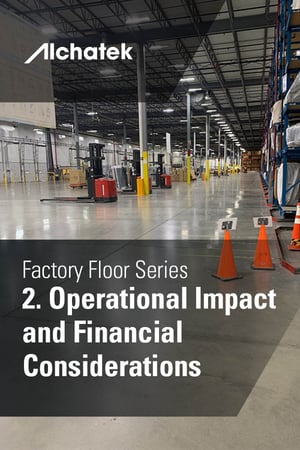
 The preceding articles in this series have dissected the operational and financial implications of slab instability in manufacturing plants and factories. This third installment will pivot to another set of equally critical concerns: safety, regulatory compliance, and environmental impact. These aspects often intertwine with operational and financial considerations, making them indispensable in any comprehensive discussion about slab instability.
The preceding articles in this series have dissected the operational and financial implications of slab instability in manufacturing plants and factories. This third installment will pivot to another set of equally critical concerns: safety, regulatory compliance, and environmental impact. These aspects often intertwine with operational and financial considerations, making them indispensable in any comprehensive discussion about slab instability.
Worker Safety: More Than Just a Checklist
Worker safety is a paramount concern in any industrial setting, and the condition of the facility's flooring plays a significant role in ensuring a safe work environment.
Tripping Hazards
Uneven or unstable slabs can create tripping hazards, particularly in areas with high foot traffic or where workers are carrying heavy loads. Tripping can result in minor injuries or escalate into more severe accidents, especially if it involves machinery or hazardous materials.
Mobile Equipment Accidents
Forklifts, trolleys, and other mobile equipment are common in industrial settings. Uneven flooring can cause these vehicles to tip over or collide with other objects, posing a significant safety risk.
Ergonomic Concerns
Floor irregularities can also have ergonomic implications. Workers may need to adopt awkward postures to navigate uneven surfaces, leading to long-term musculoskeletal issues.
Emergency Response
In the event of an emergency, such as a fire or chemical spill, unstable flooring can impede the quick and safe evacuation of workers, exacerbating the severity of the incident.
Regulatory Compliance: Navigating a Maze
Manufacturing plants and factories operate under a complex web of regulations, and flooring integrity is often part of these regulatory frameworks.
OSHA Standards
In the United States, the Occupational Safety and Health Administration (OSHA) sets forth guidelines for walking and working surfaces. Non-compliance due to floor irregularities can result in hefty fines and even legal action.
Local and State Regulations
Beyond federal guidelines, local and state regulations may impose additional requirements. Managers must be aware of these layered regulations to ensure full compliance.
Industry-Specific Guidelines
Certain industries, such as pharmaceuticals or food processing, have additional guidelines concerning floor integrity. These can include requirements for specific types of flooring materials that are resistant to chemical spills or easy to sanitize.
Documentation and Record-Keeping
Regulatory compliance is not just about meeting standards; it also involves meticulous record-keeping to document compliance. Failure to maintain these records can itself be a compliance issue.
Environmental Impact: A Growing Concern
Sustainability is increasingly becoming a focal point in industrial operations, and the methods used for slab repair can have environmental implications.
Material Choices
Traditional methods of slab repair often involve the use of materials that may not be environmentally friendly. The choice of repair materials can impact the plant's overall carbon footprint.
Waste Generation
Some repair methods generate a significant amount of waste material, which needs to be disposed of in an environmentally responsible manner.
Energy Consumption
The repair process can be energy-intensive, especially if it involves the use of heavy machinery for an extended period. This energy consumption contributes to the plant's overall environmental impact.
ISO 14001 and Sustainability Goals
For plants that are ISO 14001 certified or have specific sustainability goals, the environmental impact of slab repair methods becomes a critical consideration in choosing the right approach.
Balancing Safety, Compliance, and Sustainability
Navigating the triad of safety, regulatory compliance, and environmental impact is a complex task that requires a multi-faceted approach.
Risk Assessment
Conducting a comprehensive risk assessment can help identify the areas where slab instability poses the greatest risks in terms of safety, compliance, and environmental impact.
Technology and Innovation
Advancements in repair methods, such as the use of polyurethane solutions for concrete leveling and soil stabilization, offer a way to address these concerns effectively. These methods are quick, durable, and often more environmentally friendly than traditional approaches.
Training and Awareness
Educating the workforce about the risks associated with slab instability and the importance of reporting any irregularities can go a long way in proactive risk management.
Continuous Monitoring
Regular inspections and monitoring are essential for ensuring that the flooring remains stable over time, thereby reducing the risks associated with slab instability.
Essential Elements
Safety, regulatory compliance, and environmental impact are integral aspects of managing slab instability in industrial settings. These concerns are not isolated; they intersect with operational and financial considerations, forming a complex matrix that managers must navigate. However, the challenges are not insurmountable. By adopting a holistic approach that incorporates risk assessment, technological solutions, and continuous monitoring, it is possible to manage these concerns effectively.
Want more information on concrete leveling?


 For contractors seeking productive work during the slower winter months, Alchatek is here to help every step of the way.
For contractors seeking productive work during the slower winter months, Alchatek is here to help every step of the way.



 It's time to revisit the idea of remaining profitable during the winter months, but where does one begin?
It's time to revisit the idea of remaining profitable during the winter months, but where does one begin?
 Contractors specializing in chemical grouting in the northern United States are often constrained by the seasons when it comes to outdoor soil stabilization and slab lifting tasks. However, with strategic planning, they can also find profitable avenues to keep busy during winter.
Contractors specializing in chemical grouting in the northern United States are often constrained by the seasons when it comes to outdoor soil stabilization and slab lifting tasks. However, with strategic planning, they can also find profitable avenues to keep busy during winter.
 Technical Support
Technical Support
 Plant and factory managers must select qualified contractors in order to effectively address the challenges associated with slab instability. Choosing contractors with expertise in slab stabilization and polyurethane application will enable managers to tackle these issues successfully.
Plant and factory managers must select qualified contractors in order to effectively address the challenges associated with slab instability. Choosing contractors with expertise in slab stabilization and polyurethane application will enable managers to tackle these issues successfully.
 The preceding articles in this series have dissected the operational and financial implications of slab instability in manufacturing plants and factories. This third installment will pivot to another set of equally critical concerns: safety, regulatory compliance, and environmental impact. These aspects often intertwine with operational and financial considerations, making them indispensable in any comprehensive discussion about slab instability.
The preceding articles in this series have dissected the operational and financial implications of slab instability in manufacturing plants and factories. This third installment will pivot to another set of equally critical concerns: safety, regulatory compliance, and environmental impact. These aspects often intertwine with operational and financial considerations, making them indispensable in any comprehensive discussion about slab instability.
 The previous article in this series introduced the top 10 concerns that plant and factory managers face when dealing with unstable or sunken slabs. This installment will focus on the operational and financial implications of slab instability, two aspects that are often at the forefront of managerial concerns. Understanding these implications is crucial for making informed decisions on how to address the issue effectively.
The previous article in this series introduced the top 10 concerns that plant and factory managers face when dealing with unstable or sunken slabs. This installment will focus on the operational and financial implications of slab instability, two aspects that are often at the forefront of managerial concerns. Understanding these implications is crucial for making informed decisions on how to address the issue effectively.
 In the world of manufacturing and industrial operations, the integrity of facility floors often takes a backseat to more immediate concerns like machinery efficiency, workforce productivity, and quality control. However, the stability of concrete slabs in manufacturing plants and factories serves as the foundation upon which these critical operations rest. This article aims to shed light on the importance of maintaining stable slabs and to introduce the top 10 concerns that plant and factory managers face when dealing with unstable or sunken slabs.
In the world of manufacturing and industrial operations, the integrity of facility floors often takes a backseat to more immediate concerns like machinery efficiency, workforce productivity, and quality control. However, the stability of concrete slabs in manufacturing plants and factories serves as the foundation upon which these critical operations rest. This article aims to shed light on the importance of maintaining stable slabs and to introduce the top 10 concerns that plant and factory managers face when dealing with unstable or sunken slabs.
 In the earlier posts of this series, the importance of slab leveling, and soil stabilization has been emphasized, along with the specific risks faced by various industries and the notable advantages of using polyurethane, as supported by real-world case studies. The focus now shifts to providing commercial property owners and managers with actionable steps for effectively addressing these critical issues.
In the earlier posts of this series, the importance of slab leveling, and soil stabilization has been emphasized, along with the specific risks faced by various industries and the notable advantages of using polyurethane, as supported by real-world case studies. The focus now shifts to providing commercial property owners and managers with actionable steps for effectively addressing these critical issues.
 In the field of commercial property management, maintaining the integrity of concrete slabs and soil stability is crucial. Although the general advantages of using polyurethane have been discussed, real-world case studies provide the most compelling evidence of its effectiveness. This post will explore two such case studies to demonstrate the efficacy of polyurethane in addressing complex slab and soil challenges.
In the field of commercial property management, maintaining the integrity of concrete slabs and soil stability is crucial. Although the general advantages of using polyurethane have been discussed, real-world case studies provide the most compelling evidence of its effectiveness. This post will explore two such case studies to demonstrate the efficacy of polyurethane in addressing complex slab and soil challenges.